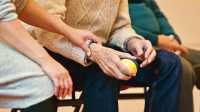Lone elderly living has proven to hasten the onset of age-related dementia and increases the chance of severe falls....
Aging, Author Interviews, CMAJ, Gender Differences, Geriatrics / 19.03.2021
The Weaker Sex? Who Lives Longer?
Smoking and heart disease partially account for the mortality gap between women and men....
Author Interviews, ENT, JAMA / 18.03.2021
Balance Disorders Linked To Greater Mortality Than Cancer or Heart Disease
MedicalResearch.com Interview with:
Chao Cao, MPH
PhD student in Movement Science,
Program in Physical Therapy, Washington University School of Medicine.
Senior author:
Lin Yang, PhD
Research Scientist/Epidemiologist
Department of Cancer Epidemiology and Prevention Research
Cancer Care Alberta | Alberta Health Services | Canada
MedicalResearch.com: What is the background for this study?
 Response: Dizziness and imbalance are common among US adults and increases the risk of serious injuries. However, research related to balance overwhelmingly focuses on functional outcomes among older adults, therefore our understanding on how balance function may affect the long-term health outcomes in adults of different age group is limited.
MedicalResearch.com: What are the main findings?
Response: We found that balance disorder affects nearly 2/3 of older Americans (65+ yr) as well as 1/3 of those middle-aged (50-64 yr). Our study, for the first time, found that for middle-aged and older Americans, their overall and sensory-specific balance disorders (visual, proprioceptive, and vestibular) were associated with higher mortality risks driven by cancer and CVD death over 12 years. (more…)
Response: Dizziness and imbalance are common among US adults and increases the risk of serious injuries. However, research related to balance overwhelmingly focuses on functional outcomes among older adults, therefore our understanding on how balance function may affect the long-term health outcomes in adults of different age group is limited.
MedicalResearch.com: What are the main findings?
Response: We found that balance disorder affects nearly 2/3 of older Americans (65+ yr) as well as 1/3 of those middle-aged (50-64 yr). Our study, for the first time, found that for middle-aged and older Americans, their overall and sensory-specific balance disorders (visual, proprioceptive, and vestibular) were associated with higher mortality risks driven by cancer and CVD death over 12 years. (more…)
 Response: Dizziness and imbalance are common among US adults and increases the risk of serious injuries. However, research related to balance overwhelmingly focuses on functional outcomes among older adults, therefore our understanding on how balance function may affect the long-term health outcomes in adults of different age group is limited.
MedicalResearch.com: What are the main findings?
Response: We found that balance disorder affects nearly 2/3 of older Americans (65+ yr) as well as 1/3 of those middle-aged (50-64 yr). Our study, for the first time, found that for middle-aged and older Americans, their overall and sensory-specific balance disorders (visual, proprioceptive, and vestibular) were associated with higher mortality risks driven by cancer and CVD death over 12 years. (more…)
Response: Dizziness and imbalance are common among US adults and increases the risk of serious injuries. However, research related to balance overwhelmingly focuses on functional outcomes among older adults, therefore our understanding on how balance function may affect the long-term health outcomes in adults of different age group is limited.
MedicalResearch.com: What are the main findings?
Response: We found that balance disorder affects nearly 2/3 of older Americans (65+ yr) as well as 1/3 of those middle-aged (50-64 yr). Our study, for the first time, found that for middle-aged and older Americans, their overall and sensory-specific balance disorders (visual, proprioceptive, and vestibular) were associated with higher mortality risks driven by cancer and CVD death over 12 years. (more…)
Aging, Geriatrics / 18.02.2021
A Guide to Staying Healthy as You Get Older
Your brain needs as much exercise as your body, so install mind-testing apps and buy some puzzle books to give...
Aging, Geriatrics / 02.02.2021
4 Reasons to Consider Respite Care
Choosing respite care can seem intimidating, but it is important to remember that you may also need a break....
Cancer occurs when cancerous cells in one area of the body reproduce rapidly and invade surrounding cells, tissue, and organs. Occasionally, these cells can spread to other parts of the body. Symptoms, treatments and the prognosis will depend on the type and stage of the cancer.
Take the time to understand the individual symptoms that they are experiencing and suggest proven solutions to relieve and manage.
For example, the symptoms of mouth or esophageal cancer will be very different from that of any other part of the body. Namely, these cancers can cause loss of the ability to chew and swallow (medically referred to as dysphagia), which are alleviated using a thickener in food and beverages. In contrast, individuals suffering from cancer of the spine are more likely to have trouble mobilizing, which would be improved by a walking aid.
Managing conditions like cancer begin with a full understanding. Read about the origin of SimplyThick Easy Mix and see the value in understanding health conditions from a patient perspective.
(more…)
Give them emotional support
Your parent is probably as confused and overwhelmed as you are, if not more. Offer them a comforting ear and allow them to talk through how it is affecting them, their concerns, their treatment options, and their wishes. Offer assistance, but don’t force it. Being too helpful could end up with your parent feeling a loss of control or independence. Organize what type and level of support you can offer, sustainable to their wellbeing, and yours. Offer spontaneous and scheduled companionship to help them to feel a sense of normalcy and provide opportunities to spend time together. If you both decide you should accompany them to their physician’s appointments and treatments, take notes, and don’t be scared to speak up if you have a question. Try to understand what they’re going through
Try to understand what they’re going through
Take the time to understand the individual symptoms that they are experiencing and suggest proven solutions to relieve and manage.
For example, the symptoms of mouth or esophageal cancer will be very different from that of any other part of the body. Namely, these cancers can cause loss of the ability to chew and swallow (medically referred to as dysphagia), which are alleviated using a thickener in food and beverages. In contrast, individuals suffering from cancer of the spine are more likely to have trouble mobilizing, which would be improved by a walking aid.
Managing conditions like cancer begin with a full understanding. Read about the origin of SimplyThick Easy Mix and see the value in understanding health conditions from a patient perspective.
(more…)
Aging, Geriatrics / 29.01.2021
Keeping Healthy as an Older Adult
As you age and get older, you need to make sure your health is at the forefront of everything you do. You need to focus on keeping healthy, ensuring you have a balanced diet that includes your recommended daily allowance of nutrition, fat, and carbohydrates. Having a balanced and healthy diet can keep you in good health and keep illnesses at bay. Exercising too is good for you, even if it just a brisk daily walk. Here's more info on how to maintain health as a senior.
 Stay Active
Keeping and staying active physically is important. Nobody is saying you have to run marathons (unless, of course, you want to) but undertaking even 15 minutes of exercise a day will leave you feeling good and re-energized. If mobility is an issue, there are plenty of beneficial and fun sit-down exercises you can try from the comfort of your chair.
Be Mentally Active
You don't just need to keep your body in shape; you also have to focus on your mental strength and ability. Doing puzzles, crosswords, or having a game of chess can keep your brain stimulated and exercised. There are lots of single-player games, as well as multi-player games online and offline that can train your brain and keep it working as well as it can.
(more…)
Stay Active
Keeping and staying active physically is important. Nobody is saying you have to run marathons (unless, of course, you want to) but undertaking even 15 minutes of exercise a day will leave you feeling good and re-energized. If mobility is an issue, there are plenty of beneficial and fun sit-down exercises you can try from the comfort of your chair.
Be Mentally Active
You don't just need to keep your body in shape; you also have to focus on your mental strength and ability. Doing puzzles, crosswords, or having a game of chess can keep your brain stimulated and exercised. There are lots of single-player games, as well as multi-player games online and offline that can train your brain and keep it working as well as it can.
(more…)
 Stay Active
Keeping and staying active physically is important. Nobody is saying you have to run marathons (unless, of course, you want to) but undertaking even 15 minutes of exercise a day will leave you feeling good and re-energized. If mobility is an issue, there are plenty of beneficial and fun sit-down exercises you can try from the comfort of your chair.
Be Mentally Active
You don't just need to keep your body in shape; you also have to focus on your mental strength and ability. Doing puzzles, crosswords, or having a game of chess can keep your brain stimulated and exercised. There are lots of single-player games, as well as multi-player games online and offline that can train your brain and keep it working as well as it can.
(more…)
Stay Active
Keeping and staying active physically is important. Nobody is saying you have to run marathons (unless, of course, you want to) but undertaking even 15 minutes of exercise a day will leave you feeling good and re-energized. If mobility is an issue, there are plenty of beneficial and fun sit-down exercises you can try from the comfort of your chair.
Be Mentally Active
You don't just need to keep your body in shape; you also have to focus on your mental strength and ability. Doing puzzles, crosswords, or having a game of chess can keep your brain stimulated and exercised. There are lots of single-player games, as well as multi-player games online and offline that can train your brain and keep it working as well as it can.
(more…)
Aging, Geriatrics / 29.01.2021
Which Care Option is Best for Your Senior Years?
There are many types and levels of support available for senior citizens, ranging from wellness checks to full-time care. Start planning for your senior years and ensure you get the retirement you desire!
Explore the possibilities and consider every option: test yourself with ‘what if?’ scenarios to help you make an informed and considerate choice.
Domiciliary care
Domiciliary care provides support with activities and hygiene regimes within your own home. Typically, domiciliary care provides a set number of hours of care per day; however, live-in domiciliary carers are also available to provide more intensive care. Choose a domiciliary care provider to support you in your senior years.What are the benefits?
Domiciliary care promotes independent living and allows the service user to remain at home, which can be beneficial to wellbeing. The user also retains their independence with the ability to set their schedule (bathing, eating, and drinking) at a time that suits them. Implementing domiciliary care staff also has the advantage of both being a source of social interaction, as well as not interrupting your surrounding social life! In-home care is also very flexible, which means that your personalized plan can be adapted as needs change. (more…)
Aging, Geriatrics / 26.01.2021
Top Tips to Plan for Your Aging Parents Future
 One of the most difficult conversations that you will need to have with your aging parents throughout their retirement is about the future. Though no matter how difficult this conversation may be, it is vital that you can plan for what might happen as a family to ensure that you are prepared for anything that comes your way. If you are struggling to do this, here are some top tips to help you comprehensively plan for your parent’s future, so they can have the most comfortable lives possible, and you do not have to worry for them.
Here are some to do lists to help you get started:.
One of the most difficult conversations that you will need to have with your aging parents throughout their retirement is about the future. Though no matter how difficult this conversation may be, it is vital that you can plan for what might happen as a family to ensure that you are prepared for anything that comes your way. If you are struggling to do this, here are some top tips to help you comprehensively plan for your parent’s future, so they can have the most comfortable lives possible, and you do not have to worry for them.
Here are some to do lists to help you get started:.
1. Look at Assisted Living Facilities
Although you might believe that your parents will always be healthy enough to live at home, this is not always the case. There are many common health conditions such as dementia, which may leave your parents needing round-the-clock care, as well as general ill health and frailty as they start to show the signs of aging. To make sure that you know that your parents are well-looked after when the time comes, you should consider researching assisted living facilities now. This will allow you to relax in knowing that both you and your loved one are happy with the home you have chosen for them. For instance, if you are looking for assisted living Fort Lauderdale, Belmont Village can offer your parents a range of care options, and you can rest in the knowledge that they are being cared for.2. Sort Their Finances
Many adult children leave their parents to handle their finances for fear of taking over or looking greedy when it comes to their eventual passing. However, helping your parents sort their finances out now can ensure that they will be able to pay for all of the medical care they may need and ensure that they have enough money to live on until the end of their lives. Sorting these finances out early, such as looking at the pension schemes and organizing the assets they have to their name, will ensure that they do not come unstuck later and enable them to set a budget around their financial situation.3. Create a Will
Although it is easy to dismiss probate as something that you do not want to think about or discuss with your parents, helping them create a will and knowing what is inside of it is important if they pass away suddenly and unexpectedly, then you can help them to make a will by contacting a solicitor or encouraging them to complete a DIY will-making kit. You should always make sure that DIY wills are legally valid, though. Knowing what is inside of the will can be important so that you can make sure that their wishes are carried out on their death and that no forgery or other issues occur. (more…)
Aging, Author Interviews, Geriatrics, Heart Disease, Lancet, Lipids / 11.11.2020
Should Statins Be Used in People Aged 70–100?
MedicalResearch.com Interview with:
Børge G. Nordestgaard, MD, DMSc
Professor, University of Copenhagen
Chief Physician, Dept. Clinical Biochemistry
Herlev and Gentofte Hospital
Copenhagen University Hospital
Herlev, Denmark
MedicalResearch.com: What is the background for this study?
Response: Previous studies have yielded mixed results regarding the association between elevated cholesterol levels and increased risk of atherosclerotic cardiovascular disease in individuals above age 70 years; with some studies showing no association and others only minimal association. However, these previous studies were based on cohorts recruiting individuals decades ago where life-expectancy were shorter and where treatment of comorbidities were very different from today
(more…)
MedicalResearch.com Interview with:
Christopher Kaufmann, PhD
Co-first author of the study and assistant professor
Division of Geriatrics and Gerontology in the Department of Medicine
UC San Diego
MedicalResearch.com: What is the background for this study? What are the main findings?
Response: We examined cannabis use by older patients seen in our geriatrics clinic at the University of California San Diego. We surveyed patients who came to our clinic for routine care, and found that 15% of those surveyed had used cannabis within the past 3 years. Half of users reported using cannabis regularly and most used for medical purposes. The most common targeted conditions were pain, problems sleeping, and anxiety, and patients found cannabis to be helpful in treating these conditions. We also found that 61% had initiated cannabis use after age 60, and these new users engaged in less risky consumption practices than current users who also used earlier in life. (more…)
Aging, Author Interviews, BMJ, Exercise - Fitness / 08.10.2020
Is Exercise Intensity Related to Longevity?
MedicalResearch.com Interview with:
Ulrik Wisløff
Professor and Head of CERG and K.G. Jebsen Centre for Exercise in Medicine
of Circulation and Medical Imaging, Faculty of Medicine and Health Sciences
NTNU-Norwegian University of Science and Technology
Trondheim, Norway
MedicalResearch.com: What is the background for this study?
Response: The Generation 100 study followed more than 1500 women and men in their 70s for five years. The aim was to find out if exercise gives older adults a longer and healthier life, and we also compare the effect of moderate and high-intensity exercise.
MedicalResearch.com: What are the main findings?
Response: Overall survival was high in all three groups, compared to what’s expected in this age group. There was a clear trend towards greater survival in the high-intensity compared to the moderate intensity exercise group. High-intensity interval training also had the greatest effect on cardiorespiratory fitness and health-related quality of life. (more…)
Aging, Author Interviews, Geriatrics / 21.09.2020
Shifting The Burden Of Care: Assisted Living Facility Closures Mean Children Must Care For Their Parents
Difficult as it may be, the time has come for children to take over the roles that were previously held...
Author Interviews, COVID -19 Coronavirus, Geriatrics, JAMA / 14.07.2020
Report Underscores Importance of Universal COVID-19 Testing in Nursing Homes
It is critical to rapidly enact widespread testing so that positive cases can be identified and isolated before more transmission occurs....
Aging, Author Interviews / 11.07.2020
Mifepristone Increases Lifespan in Flies and Worms…Can It Improve Longevity in Humans?
MedicalResearch.com Interview with:
John Gerard Tower
Professor of biological sciences
University of Southern California
MedicalResearch.com: What is the background for this study?
Response: Mifepristone is a synthetic steroid drug that is used in humans for birth control and as a treatment for Cushing’s disease, and is currently in clinical trials as an anti-cancer treatment.
We have previously shown that mifepristone dramatically increases the life span of mated female Drosophila flies. (more…)
Author Interviews, Brigham & Women's - Harvard, Geriatrics, Lipids / 08.07.2020
Age Alone Not A Reason to Withhold Statins in Older Adults
MedicalResearch.com Interview with:
Ariela Orkaby, MD, MPH
Geriatrics & Preventive Cardiology
Associate Epidemiologist
Division of Aging, Brigham and Women's Hospital
Assistant Professor of Medicine, Harvard Medical School
MedicalResearch.com: What is the background for this study?
Response: Statins are cholesterol lowering medications that have been proven to prevent heart attacks, strokes and death in middle-aged adults. Current guidelines for cholesterol lowering therapy are uncertain as to treatment for older adults due to a lack of available data, even though older adults are at the highest risk of heart disease and death. (more…)
Aging, Author Interviews / 11.03.2020
Supporting The Evolving Needs Of Patients With A Specialist Healthcare Business
 Healthcare is now the fastest-growing industry in the US, and currently employs over 18 million people. With an increasing number of patients with chronic and mental health conditions, and a steady rise in the number of elderly patients, specialized healthcare businesses could help to take care of growing needs. Depending on your professional field, setting up your own healthcare business could involve developing apps to help manage common chronic conditions, offering counseling to alleviate the stress of bereavement, or assisting a rapidly aging population.
(more…)
Healthcare is now the fastest-growing industry in the US, and currently employs over 18 million people. With an increasing number of patients with chronic and mental health conditions, and a steady rise in the number of elderly patients, specialized healthcare businesses could help to take care of growing needs. Depending on your professional field, setting up your own healthcare business could involve developing apps to help manage common chronic conditions, offering counseling to alleviate the stress of bereavement, or assisting a rapidly aging population.
(more…)
Annals Internal Medicine, Author Interviews, Breast Cancer, Brigham & Women's - Harvard, Cancer Research, Mammograms / 25.02.2020
After Age 75 Mammograms May Not Decrease Chance of Dying of Breast Cancer
MedicalResearch.com Interview with:
Xabier Garcia-De-Albeniz MD PhD
Research Associate
Department of Epidemiology
Harvard T.H. Chan School of Public Health
Mongan Institute for Health Policy
Massachusetts General Hospital
MedicalResearch.com: What is the background for this study?
Response: The goal of breast cancer screening is to reduce deaths from breast cancer by finding breast cancer at early, more treatable stages. The main way to screen for breast cancer is periodic mammography, which is an x-ray of the breast that can show tumors before they are large enough to feel. High-quality studies called clinical trials have shown that screening women in their 50s and 60s decreases breast cancer deaths. However, the point at which women can safely stop screening because it no longer decreases breast cancer deaths has not been studied. More than half of women in the United States continue screening mammography after age 75 years. (more…)
Author Interviews, Endocrinology, Geriatrics, Thyroid Disease / 15.12.2019
Treating Subclinical Thyroid Disease in Elderly May Not Provide Benefits
MedicalResearch.com Interview with:
Carol Chiung-Hui Peng, MD
Department of Internal Medicine
University of Maryland Medical Center
Baltimore, MD
MedicalResearch.com: What is the background for this study?
Response: In recently published meta-analyses, focusing on the general population, showed that both overt hypothyroidism and subclinical hypothyroidism were linked to higher all-cause and cardiovascular mortality. However, there is still debate and conflicting evidence on managing overt and subclinical hypothyroidism in the elderly.
This study aimed to evaluate and confirm the association between hypothyroidism and mortality in the elderly population.
(more…)
Author Interviews, Frailty, Geriatrics / 30.09.2019
Could Muscle Strength in Older Adults Be Improved by Stimulating Nerves?
MedicalResearch.com Interview with:
Brian Clark, Ph.D.
Executive Director, Ohio Musculoskeletal and Neurological Institute
Osteopathic Heritage Foundation Harold E. Clybourne, D.O.
Endowed Research Chair
Professor of Physiology
OHIO University
MedicalResearch.com: What is the background for this study?
Response: Muscle weakness strongly contributes to mobility limitations and physical disability. Over 40% of the 46 million older adults in the U.S. have one or more physical limitations when performing daily tasks essential for maintaining independence. Preserving physical function is a major public health priority as it will drastically reduce health care costs and improve quality of life. Over the past several decades, the scientific and medical communities have recognized that muscle weakness is a major factor in determining the incidence of physical limitations and general poor health in older adults.
It has long been presumed by many that age-related weakness is principally caused by loss of muscle mass (i.e., sarcopenia). However, over the past 10-20 years the presumption has been questioned. For instance, a 2009 study reported that the decline in leg extensor muscle strength in older adults —observed longitudinally over 5 years—occurs more rapidly than the concomitant loss of quadriceps mass, and that in a subset of older adults that actually gained muscle mass there was still a substantial loss of strength. Findings of this nature clearly illustrate that that the loss of strength is only modestly associated with loss of mass in older adults. The mechanisms of muscle strength, however, are multifactorial and determined by a combination of both neurological and muscular factors (of which muscle mass is one of the factors).
(more…)
Author Interviews, Cognitive Issues, End of Life Care, Gender Differences, JAMA / 16.08.2019
Men With Dementia More Likely to Receive Aggressive Care at End of Life
MedicalResearch.com Interview with:
Dr. Nathan Stall, MD
Geriatrician and Research fellow
Women’s College Research Institute
Dr. Paula Rochon, MD, MPH, FRCPC
Periatrician and Vice-President of Research
Women’s College Hospital
MedicalResearch.com: What is the background for this study?
Response: The advanced stages of the dementia are characterized by profound memory impairment, an inability to recognize family, minimal verbal communication, loss of ambulatory abilities, and an inability to perform basic activities of daily living. Nursing homes become a common site of care for people living with advanced dementia, who have a median survival of 1.3 years. In the advanced stages of the disease, the focus of care should generally be on maximizing quality of life.
Our study examined the frequency and sex-based differences in burdensome interventions received by nursing home residents with advanced dementia at the very end of life. Burdensome interventions include a variety of treatment and procedures that are often avoidable, may not improve comfort, and are frequently distressing to residents and their families. We found that in the last 30 days of life, nearly one in 10 nursing home residents visited an emergency department, more than one in five were hospitalized, and one in seven died in an acute care setting. In addition, almost one in 10 residents received life-threatening critical care; more than one in four were physically restrained; and more than one in three received antibiotics. (more…)
Accidents & Violence, Author Interviews, Geriatrics / 13.08.2019
Definition of Elder Mistreatment May Vary by Ethnicity
MedicalResearch.com Interview with:
 XinQi Dong MD, MPH
Henry Rutgers Distinguished Professor of Population Health Sciences
Director of the Director of Institute for Health, Health Care Policy and Aging Research
Rutgers University
New Brunswick, NJ 08901
MedicalResearch.com: What is the background for this study? What are the main findings?
Response: This study was done among community-dwelling US Chinese older adults aged 60 and above living in the greater Chicago area. The baseline cohort consisted of 3,157 participants, and we followed up with them from 2011 to 2017. There were heterogeneities in the associations between the strictness of definitions and subtypes of elder mistreatment (EM) and yearly mortality. (more…)
XinQi Dong MD, MPH
Henry Rutgers Distinguished Professor of Population Health Sciences
Director of the Director of Institute for Health, Health Care Policy and Aging Research
Rutgers University
New Brunswick, NJ 08901
MedicalResearch.com: What is the background for this study? What are the main findings?
Response: This study was done among community-dwelling US Chinese older adults aged 60 and above living in the greater Chicago area. The baseline cohort consisted of 3,157 participants, and we followed up with them from 2011 to 2017. There were heterogeneities in the associations between the strictness of definitions and subtypes of elder mistreatment (EM) and yearly mortality. (more…)
 XinQi Dong MD, MPH
Henry Rutgers Distinguished Professor of Population Health Sciences
Director of the Director of Institute for Health, Health Care Policy and Aging Research
Rutgers University
New Brunswick, NJ 08901
MedicalResearch.com: What is the background for this study? What are the main findings?
Response: This study was done among community-dwelling US Chinese older adults aged 60 and above living in the greater Chicago area. The baseline cohort consisted of 3,157 participants, and we followed up with them from 2011 to 2017. There were heterogeneities in the associations between the strictness of definitions and subtypes of elder mistreatment (EM) and yearly mortality. (more…)
XinQi Dong MD, MPH
Henry Rutgers Distinguished Professor of Population Health Sciences
Director of the Director of Institute for Health, Health Care Policy and Aging Research
Rutgers University
New Brunswick, NJ 08901
MedicalResearch.com: What is the background for this study? What are the main findings?
Response: This study was done among community-dwelling US Chinese older adults aged 60 and above living in the greater Chicago area. The baseline cohort consisted of 3,157 participants, and we followed up with them from 2011 to 2017. There were heterogeneities in the associations between the strictness of definitions and subtypes of elder mistreatment (EM) and yearly mortality. (more…)
Author Interviews, Frailty, Geriatrics, Heart Disease / 29.07.2019
Some Medications for Atrial Fibrillation May Raise Risk of Falls
MedicalResearch.com Interview with:
 MedicalResearch.com: What is the background for this study?
Response: We know that having atrial fibrillation puts you at a higher risk of falls, especially if you are elderly and frail. Additionally, some of the medications used to treat it can cause bradycardia (low heart rate), which could itself increase the risk of falls. Therefore, the aim of this study was to investigate if common medications used to treat atrial fibrillation in older patients were associated with fall-related injuries and syncope (fainting). The medications investigated were rate-lowering drugs (beta-blockers, digoxin, verapamil, diltiazem) and the anti-arrhythmic drugs (amiodarone, propafenone, and flecainide).
(more…)
MedicalResearch.com: What is the background for this study?
Response: We know that having atrial fibrillation puts you at a higher risk of falls, especially if you are elderly and frail. Additionally, some of the medications used to treat it can cause bradycardia (low heart rate), which could itself increase the risk of falls. Therefore, the aim of this study was to investigate if common medications used to treat atrial fibrillation in older patients were associated with fall-related injuries and syncope (fainting). The medications investigated were rate-lowering drugs (beta-blockers, digoxin, verapamil, diltiazem) and the anti-arrhythmic drugs (amiodarone, propafenone, and flecainide).
(more…)
 MedicalResearch.com: What is the background for this study?
Response: We know that having atrial fibrillation puts you at a higher risk of falls, especially if you are elderly and frail. Additionally, some of the medications used to treat it can cause bradycardia (low heart rate), which could itself increase the risk of falls. Therefore, the aim of this study was to investigate if common medications used to treat atrial fibrillation in older patients were associated with fall-related injuries and syncope (fainting). The medications investigated were rate-lowering drugs (beta-blockers, digoxin, verapamil, diltiazem) and the anti-arrhythmic drugs (amiodarone, propafenone, and flecainide).
(more…)
MedicalResearch.com: What is the background for this study?
Response: We know that having atrial fibrillation puts you at a higher risk of falls, especially if you are elderly and frail. Additionally, some of the medications used to treat it can cause bradycardia (low heart rate), which could itself increase the risk of falls. Therefore, the aim of this study was to investigate if common medications used to treat atrial fibrillation in older patients were associated with fall-related injuries and syncope (fainting). The medications investigated were rate-lowering drugs (beta-blockers, digoxin, verapamil, diltiazem) and the anti-arrhythmic drugs (amiodarone, propafenone, and flecainide).
(more…)
MedicalResearch.com Interview with:
Jay Olshansky, Ph.D.
Division of Epidemiology and Biostatistics
School of Public Health University of Illinois Chicago
Chicago, Illinois
MedicalResearch.com: What is the background for this study?
Response: In 2011 I published the first scientific evaluation of the observed longevity of all of the U.S. presidents. Since then, I've been contacted by the media every four years to comment on the ages of the presidential candidates. This is relevant because the number of older candidates is on the rise, and their ages are getting higher. A reporter from the Washington Examiner contacted me this time around to comment once again, and wanted to know whether I was planning on doing another analysis. When I looked at the list of candidates that were much older this time around, I thought it would be a good idea to see what science had to say about the health and longevity prospects of all of the candidates. This way we could at least offer a scientific explanation of whether age should be relevant at all when choosing a presidential candidate.
(more…)
Annals Thoracic Surgery, Author Interviews, Beth Israel Deaconess, Brigham & Women's - Harvard, Geriatrics, Heart Disease, Primary Care / 23.07.2019
Older Adults Should Reevaluate Daily Aspirin
MedicalResearch.com Interview with:
Christina C. Wee, MD, MPH
Associate Professor of Medicine
Harvard Medical School
Director , Obesity Research Program Division of General Medicine
Beth Israel Deaconess Medical Center (BIDMC)
Associate Program Director, Internal Medicine Program, BIDMC
Deputy Editor of the Annals of Internal Medicine
MedicalResearch.com: What is the background for this study?
Response: New research is showing that for many people without diagnosed heart disease, the risk of bleeding may outweigh the benefits of taking a daily aspirin particularly in adults over 70 years of age. The American Heart Association and the American College of Cardiology recently updated their guidelines and now explicitly recommend against aspirin use among those over the age of 70 who do not have existing heart disease or stroke.
Our study found that in 2017, a quarter of adults aged 40 years or older without cardiovascular disease – approximately 29 million people – reported taking daily aspirin for prevention of heart disease. Of these, some 6.6. million people did so without a physician's recommendation.
(more…)
Author Interviews, Geriatrics, Hip Fractures, JAMA, Orthopedics, Osteoporosis / 17.06.2019
Older Women Need Screening For Hip Fracture Risk
MedicalResearch.com Interview with:
Kristine E. Ensrud MD MPH
Professor of Medicine and Epidemiology and Community Health
University of Minnesota
Core Investigator, Center for Care Delivery and Outcomes Research
Minneapolis VA Health Care System
MedicalResearch.com: What is the background for this study?
Response: Women aged 80 years and older, a rapidly growing segment of the population, account for the majority of hip fractures in the United States. Hip fractures account for 72% of fracture-related health care expenditures and lead to significant morbidity and mortality. However, many late-life women at high risk of hip fracture are undiagnosed. Clinicians have difficulty identifying late-life women most likely to benefit from osteoporosis screening and interventions to prevent hip fracture in part due to concerns about comorbidity burden and prognosis in this patient population. (more…)
Accidents & Violence, Author Interviews, Exercise - Fitness, Geriatrics, JAMA / 05.06.2019
Home Based Physical Therapy Can Help Prevent Falls in the Elderly
MedicalResearch.com Interview with:
Teresa Liu-Ambrose, PT, PhD
Canada Research Chair (Tier II), Physical Activity, Mobility, and Cognitive Neuroscience
Director, Aging, Mobility, and Cognitive Neuroscience Laboratory
University of British Columbia
MedicalResearch.com: What is the background for this study?
Response: Falls in older adults are the third-leading cause of chronic disability and the leading cause of hospitalization for adults over age 65. Older adults who experience multiple falls are at increased risk for disability, loss of independence, and even death. How to best prevent falls in this high risk group is not well established.
(more…)
Accidents & Violence, Author Interviews, JAMA / 20.05.2019
Early Life Maltreatment Linked to Increased Risk of Elder Abuse
MedicalResearch.com Interview with:
XinQi Dong
Director, Institute for Health, Health Care Policy, and Aging Research
Henry Rutgers Distinguished Professor of Population Health Sciences
Professor, Department of Medicine - Division of General Internal Medicine, Robert Wood Johnson Medical School
MedicalResearch.com: What is the background for this study? What are the main findings?
Response: Interpersonal violence is a substantial public health issue across all socio-demographic and socioeconomic strata globally. A depth of prior studies have found that victims of childhood sexual abuse might have higher risks of re-experiencing sexual violence as adults. But the “re-victimization” phenomenon has been insufficiently examined among the rapidly growing aging populations. There lacks examinations about life-course violence experiences and the accumulative effect of which in older ages.
Our study examined three most common forms of interpersonal violence (child maltreatment, intimate partner violence, and elder abuse) across the life span and found an interconnectedness among them. Individuals with a history of child maltreatment and/or intimate partner violence had two to six times higher risks of elder abuse compared to those without a past experience of the violence. (more…)
Author Interviews, Geriatrics, Kidney Disease / 05.05.2019
Performance of Formulas for Estimating Kidney Function in the Elderly
MedicalResearch.com Interview with:
Dr. Luciano da Silva Selistre MD MS PhD
Professor de Medicina - UCS
MedicalResearch.com: What is the background for this study? What are the main findings?
Response: We have found that no equation for estimating renal function in the elderly is fully accurate. There are important mistakes between them.
(more…)
Author Interviews, Diabetes, Geriatrics, Stroke / 06.04.2019
Acetaminophen and Stroke Risk in Diabetic Nursing Home Patients
MedicalResearch.com Interview with:
Philippe Girard, MD,
Gérontopôle de Toulouse, CHU Toulouse
Toulouse, France
MedicalResearch.com: What is the background for this study?
Response: The idea for this study came about in 2016 when a systematic review assessing acetaminophen’s adverse event (AEs) profile came out with results suggesting increased mortality and morbidity (Paracetamol: not as safe as we thought? A systematic literature review of observational studies, PMID: 25732175).
Pr Yves Rolland had collected data from his IQUARE study (Improving the Quality of Care of Long-Stay Nursing Home Residents in France, PMID: 26782872) including all prescriptions from over 6000 nursing home residents and all their medical history over an 18 month follow-up period.
We thought it would be a good idea to assess the safety profile of acetaminophen on this geriatric population. (more…)
























